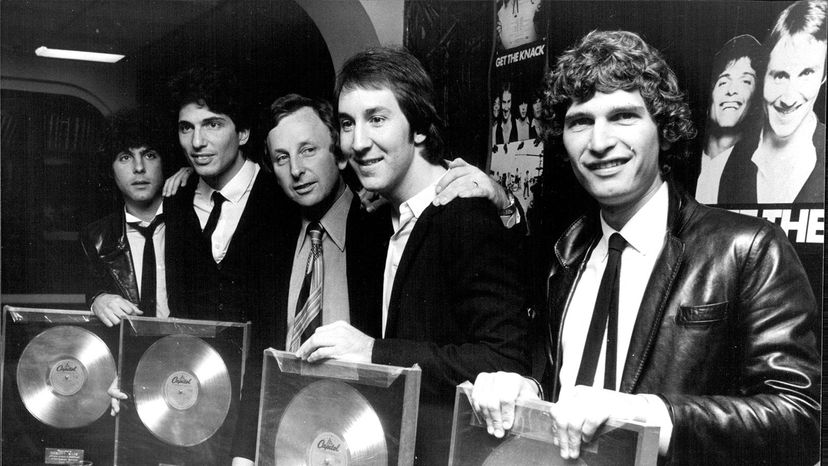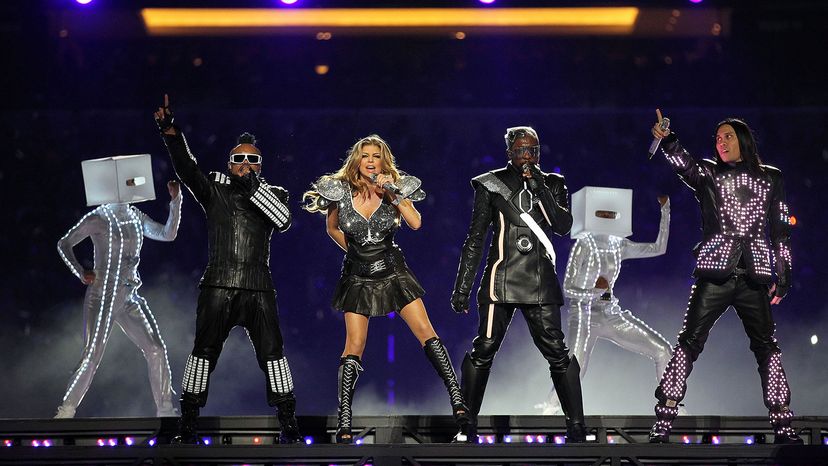
Even if you've never heard of the New Wave rock band The Knack, you've definitely heard their 1979 song "My Sharona." Reportedly written in 15 minutes, "My Sharona" was a breakout hit for the unknown band, spending six weeks at No. 1 on the "Billboard Hot 100" charts and helping to sell 500,000 copies of The Knack's debut album in just 13 days.
More than 40 years later, "My Sharona" is a staple of classic rock radio and has been featured in movies and TV commercials. The Knack kept churning out albums, but never came close to matching the success of "My Sharona."
Advertisem*nt
Yes, The Knack are textbook examples of a "one-hit wonder," but that one hit has been a goldmine. Just ask Berton Averre, guitarist for The Knack and co-writer of "My Sharona" with the band's late lead singer, Doug Fieger.
"When people say, 'What do you do for a living?' I say, 'I go to my mailbox a couple times a month,'" Averre told The Washington Times in 2015. "That song has been so good to me."
You know another song that's been "good" to its one-hit wonder creator? "Where Everybody Knows Your Name," the theme song for the hit TV show "Cheers," recorded by a broke young songwriter named Gary Portnoy in 1982.
Portnoy both wrote and performed the song (including background vocals), and receives royalties every single time it's played. For reference, "Cheers" filmed 275 episodes that are in syndication in 40 countries plus streaming (Peaco*ck) and digital downloads.
When Portnoy was asked in a 2012 interview if he could have lived off of "Cheers" royalties and never worked again, the songwriter laughed and said, "Yes, it has been a comfortable life."
Advertisem*nt
Contents
- That Was Then. What About Today?
- Copyrights and Royalties — Why It Pays to Be the Songwriter
- Why Streaming Alone Won't Make You Rich
- In Some Ways, It's a Great Time to Be a One-hit Wonder
That Was Then. What About Today?
One-hit wonders like Portnoy and Averre from The Knack are exceedingly rare. They won the equivalent of the pop music Powerball lottery in the 1970s and '80s by writing world-conquering hits that continued to generate substantial royalties for decades.
But they're not the only ones. The website Celebrity Net Worth estimated that Don ("American Pie") McLean earns $300,000 in combined royalties every year while Gerry Rafferty earned $100,000 a year off his 1978 song "Baker Street."
Advertisem*nt
The question is, can today's artists still hope to strike it rich with one massive hit and ride off into the royalty-filled sunset? Now that the music industry is dominated by streaming platforms that pay fractions of a penny per play, can musicians even make the equivalent of minimum wage from royalties alone?
We spoke with Randy Chertkow and Jason Feehan, co-authors of "Making Money with Music," to make sense of the confounding world of music royalties, and to find out how today's musicians can still make bank from a big hit, if they play it smart.
Advertisem*nt
Copyrights and Royalties — Why It Pays to Be the Songwriter
The music business is one of the most heavily regulated industries around, say Chertkow and Feehan, and if you need proof, look no further than the hopelessly arcane system of music royalties. A lot of different entities take a cut of every song, and just because you're the lead singer in a band, it doesn't mean that you'll make significant money, even from a hit.
In simplest terms, there are two types of copyright for every song: the sound recording and the composition. Both of those copyrights pay different sets of royalties. The bad news is that the artist is often last in line.
Advertisem*nt
Let's start with the sound recording. Every time a song is streamed, downloaded or sold in a physical format (record, tape, CD), the "rights holder" to the sound recording copyright gets paid. Unfortunately, for most bands signed to a record label, the rights holder is the record label, not the musician.
Chertkow says that you can only collect sound recording royalties if you own the masters (original versions) of your recordings, which is uncommon for young musicians, who are lucky if their contract gives them a small cut of the sound recording royalties.
The composition rights are a different story. The songwriter holds the copyright for the composition. So, if you actually write a hit song (versus recording somebody else's song), then you can collect serious royalties depending on how much you have to share with the record label, publishers and other rights holders.
"The songwriter back in that day was the one who could actually make a living off of and really sail away into the sunset," says Feehan. "That created some of the bitterest arguments that you've ever seen, though. If you perform on an album and your guitar solo is THE famous guitar solo and the song is huge, you're still not making money on the songwriting at all. That's why a lot of bands broke up over money."

Here are the different types of composition royalties paid to the songwriter:
- Mechanical License Royalties are royalties paid to the songwriter every time the song is sold in any form. The mechanical license royalty rate for physical sales (records, tapes and CDs) and digital downloads are set by U.S. copyright law at 9.1 cents per song or 1.75 cents per minute of playing time, whichever is higher. Streaming rates are way lower, just $0.0032 (less than one-third of a cent) per stream on Spotify, for example.
- Performance Royalties are paid to the songwriter every time the song is performed in public, which includes not just live shows, but radio and streaming, too. Most signed musicians have to split this royalty with a publisher.
- Sync License Royalties are paid when a song is licensed to a movie, TV show, commercial or even a TikTok creator. Again, most musicians have a publisher that handles licensing, and the publisher usually takes a big cut of sync royalties.
- Print Royalties are paid when print copies of the music are sold, which isn't a big revenue earner for pop music.
Advertisem*nt
Why Streaming Alone Won't Make You Rich
When music fans still bought physical records, tapes and CDs, or paid $1.99 to download a song from iTunes, the songwriter would at least get a few cents. But now that streaming dominates the music industry, those royalty payouts have taken a nosedive.
According to the Recording Industry Association of America (RIAA), streaming now accounts for 84 percent of all of the money made from music in the United States. Physical CDs and records account for only 10 percent of music sales and digital downloads are down to 5 percent.
Advertisem*nt
While it's very hard to pin down exact numbers for how much artists make per stream — payouts depend on whether the listener is a paid subscriber and where they live, among other factors — the highest rates are still around half a cent per stream. And the truth is that most signed artists are only seeing a fraction of that fraction of a penny.
"The reality is a lot of that money is going to the labels and they're giving a tiny portion to the artist," says Feehan.
Even if an unsigned, independent band managed to release a viral hit, they would be hard-pressed to recoup the equivalent of minimum wage from streaming alone. According to Digital Music News, a musician from California would have to score more than 455,000 streams a month (5.46 million a year) just to earn the state's minimum wage, which is $14 an hour.
"Even if you're independent, I still think it's rather challenging to make enough money just off of royalties, even if it's a really big hit," says Chertkow. "We really find that need multiple sources of income."
Advertisem*nt
In Some Ways, It's a Great Time to Be a One-hit Wonder
Successful one-hit wonders like The Knack are so rare because they broke out during an era when only a small handful of record labels were the all-powerful gatekeepers. Of course, some mega-artists of today like Adele and Drake still make huge money off music sales and downloads, but they are the exception.
While it's true that today's artists can't expect to retire off of royalties alone, they have so many platforms for reaching music fans directly and bypassing the money-grabbing middle men (record labels, publishers, etc.).
Advertisem*nt
"As an independent musician today, you have more opportunities to become a successful 'one-hit wonder' by getting your songs out there through today's technology," says Feehan.
Truly independent musicians function as their own record label and own their masters, which means they can collect all royalties including the sound recording.
But the key, write Feehan and Chertkow in their book, is 1) to register for all the copyrights and royalties that you're due (there are 17 different steps to complete across multiple agencies), and 2) to parlay the short-lived fame of a viral hit song into long-term steady revenue from multiple different sources.
Touring is a big one. This is traditionally where musicians cash in. According to a former executive from MCA/Universal Music, a band with just one hit song can still rake in between $10,000 and $50,000 a show. And even better, the band itself keeps between 85 and 95 percent of that, sharing the rest with their manager.
One 2013 Northwestern University study on working musicians and income showed on average, performing made up 28 percent of their income and teaching another 22 percent. Money made from songwriting and recording made up just 12 percent of their income (we assume most or all of these musicians never scored a big hit). Around 70 percent of the respondents earned less than $50,000 a year.
In their book and on the Making Money with Music website, Chertkow and Feehan detail more than 300 additional revenue sources for independent musicians who want to turn their passion into a lucrative career. Today's one-hit wonders may not be able to "collect checks for a living" like The Knack, but they can build a loyal fanbase and take control of their finances like never before.
HowStuffWorks earns a small affiliate commission when you purchase through links on our site.
Now That's Cool
In the U.S., if you register as the copyright holder of a song, that copyright will last your entire lifetime, plus 70 years, meaning your grandkids could still collect fat royalty checks.
Advertisem*nt